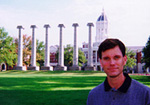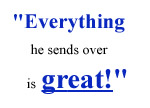 Michael Stanley, director of research for the Center of Science and Industry in Columbus, Ohio, amazes youngsters with his unique ability to hammer a nail into wood with a banana. His secret? The banana was first frozen with liquid nitrogen.
Michael Stanley, director of research for the Center of Science and Industry in Columbus, Ohio, amazes youngsters with his unique ability to hammer a nail into wood with a banana. His secret? The banana was first frozen with liquid nitrogen.
Science Fair
demonstrations
present marvels
of chemistry
By Mark Ziegler
Monsanto World News
Eerie events were occurring in suburban St. Louis last week.
A nail was hammered into a piece of wood -- with a banana.
A normally bouncy racquetball was thrown against a wall -- and shattered.
No need to worry -- it was just a scientist displaying the marvels of science during a chemistry demonstration at the 1984 Monsanto-St. Louis Post-Dispatch Science Fair April 9-17.
Nearly 2,700 students from about 350 area schools exhibited projects in the fair, held at the Greensfelder Recreation Complex in Queens Park, Mo. Monsanto, the fair sponsor for the past seven years with the Post-Dispatch, awarded up to $10,000 in scholarships to senior students in the honors division whose exhibits best demonstrated the benefits of science to mankind. The science fair committee presented hundreds of trophies, medals and ribbons to students in the top 45 percent of both the elementary (K-6) and secondary (7-12) divisions.
But what really had fair attendees oohing and ahhing were the Monsanto-sponsored chemistry demonstrations performed by Michael Stanley, director of research for the Center of Science and Industry in Columbus, Ohio, and George Gilbert, professor of chemistry at Denison University in Granville, Ohio.
"The chemistry demonstrations have become a very popular feature," said Lois Johnson, Monsanto's coordinator for the fair. "Mike and George really make them visually exciting."
Viewed by more than 4,000 individuals last year, the demonstrations were designed to stir an interest in chemistry among those who have little knowledge of it. The demonstrations discussed themes such as light in chemistry, hot and cold, taste and smell, and metals and non-metals, and featured household items such as ammonia, vinegar, lemon juice, red cabbage, baking soda and sugar. But to those witnessing the demonstrations, all of that translated into a series of small explosions, fires, bubbling gases and liquids mysteriously changing colors.
One experiment that really had attendees buzzing was the banana used to pound a nail into a piece of wood. The banana had help -- Stanley first froze the fruit by dipping it into a container of liquid nitrogen (-320 degrees). A racquetball immersed in the same substance lost most of the air in its center and promptly shattered when thrown against a wall, much to the surprise of nearby spectators and the delight of youngsters who pushed and shoved to capture a remnant of the ball.
"Those two demonstrations are always eye-catching," quipped Stanley.
Gilbert and Stanley poured vinegar into a beaker containing baking soda, setting off a bubbling reaction that reached the top of the beaker. The resulting carbon dioxide gas was used to put out a candle flame in another jar.
In another experiment, the scientists used the reactions of chemicals to amaze the crowd. Two colorless fluids were combined, but nothing happened -- for about 15 seconds. The resulting "clock" reaction turned the combined fluids purple. During a "light" reaction, a jar of clear chemical fluid was "accidentally" placed by a lamp, and gradually turned bluish-green.
Normalcy returned by the end of each demonstration, and all seemed to enjoy seeing the applications of science -- even the parent whose dollar bill was set on fire and inexplicably remained intact.





